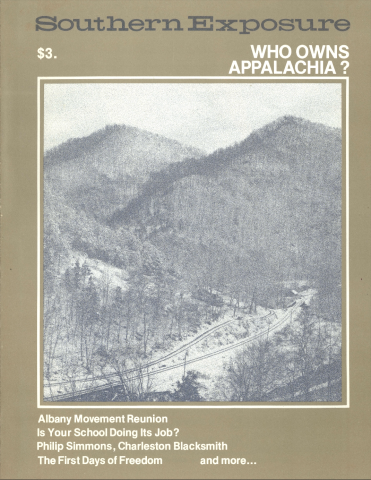This Has Gone Far Enough

This article originally appeared in Southern Exposure Vol. 10 No. 1, "Who Owns Appalachia?" Find more from that issue here.
“Somewhere way back we lost ourselves. I think it was when the companies bought up the land.”
— a West Virginia farmer
Stories of how the land was lost are a powerful component of the oral history of Appalachia, and they flesh out the statistical data in the Appalachian Land Ownership Study. In county after county, we heard about ownership rights clouded by mysterious courthouse fires, phony quitclaim deeds foisted on ancestors, questionable historical patents reemerging in company hands, “sales” by widows when authentic heirship had passed to the children, uncounted mineral wealth traded for sewing machines, forged deeds, paltry royalties on leases negotiated generations ago, unrestricted access to severed mineral estates by strip miners and oil and gas drillers.
This kind of testimony, in combination with facts documented in the study, can now engender an Appalachian native rights consciousness and encourage local people to resist the enveloping corporate and absentee land control and defend their cultural, social and economic integrity.
Local people are learning fast that land ownership configurations are really power configurations, and they are gaining confidence in their own right to the land. They are beginning to sort through the complex web of relationships that makes this kind of analysis so elusive. In the words of the West Virginia report, “The real villain 52 is a style of politics established and maintained by external domination .. . yet the submission demanded by the colonial nature of corporate needs is eroding and giving way to an often dramatic enthusiasm for reform.”
“I want all the corporations to leave the county. That would get rid of all the crooked politicians and enable people to control the land and their lives again. These corporations just stole the minerals from a lot of people. I believe, though, that stolen land could be got back if enough people would get together.”
— an elderly resident of West Virginia
A number of local groups and individuals have taken the coding methodology developed in the land study and begun their own courthouse research. Soil conservation and agricultural groups are promoting plans to control development rights and restrict corporate acquisition of family farms. Some are working on tax reform (see article on page 49). Still other new coalitions and the Appalachian caucuses of several church denominations are committed to more stringent regulations and protection of the use of surface land and water and to increases in liability of corporate owners for damage to the land. As a result, strip mining and reclamation are being closely monitored, plans to strip-mine for oil shale have been exposed, and new laws are being drafted to expand surface owners’ rights.
“West Virginia is used to being exploited by outsiders whether they come from Philadelphia or Japan…We are in sad need of land reform. We have haciendas, we just don’t call them that.”
— a West Virginia resident
A number of groups are also beginning to address the need to regain control of the land lost to the corporate and absentee interests long ago. They are arguing that no oil and gas drilling should be allowed without the permission of the surface owner. They are working toward nullification of leases with grossly unfair terms and those that have been violated by the lessee. Some people are simply moving back onto land that was stolen from them (see article on page 50).
Ultimately, though, Appalachians must challenge and qualify the concept of private property itself. They must enter a realm of conflicting rights — the traditional sanctity of private property must be balanced against the right to safe and plentiful housing, the right of protection from pollution, flooding, erosion and toxic substances, and the right of communities to grow and plan for the future.
In some cases the Appalachian Land Ownership Study has been the catalyst for organizing; in others it has served as an affirmation. In West Virginia, it has created a rare occasion for the state’s biggest newspaper, the Charleston Gazette, to agree with concerned community groups: “We join with the Task Force in deploring the spreading corporate ownership and its effect on the people. Additionally, we believe that outside ownership and its attendant influence . . . which has overshadowed the whole history of this state, has gone far enough.”
As always, though, a local farmer says it best: “You know what happened in other countries when they got to where we’re headed. They redistributed the land. We’ve got to do that.”
Tags
David Liden
David Liden works for the Southern West Virginia Land Reform Project. He was coordinator of the West Virginia Task Force for the land study. (1982)